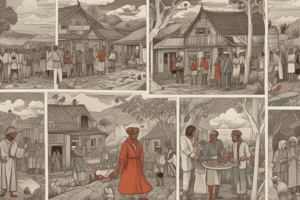Podcast
Questions and Answers
Relaciona los siguientes términos con su descripción:
Relaciona los siguientes términos con su descripción:
Fábulas = Ofrecen enseñanzas sobre virtudes como el trabajo duro, la paciencia y la precaución. Mitos = Relatan los orígenes de fenómenos naturales a través de historias vívidas. Leyendas y Sagas = Narraciones de eventos extraordinarios arraigados en culturas específicas. Ética = Conceptos morales transmitidos a través de historias tradicionales.
Asocia los siguientes elementos con su respectiva mitología:
Asocia los siguientes elementos con su respectiva mitología:
Héroes y Dioses Griegos = Batallas épicas y la relación entre humanidad y divinidad. Fuerzas Cósmicas Nórdicas = Formación del universo y reflexiones sobre temas universales. Valquirias = Figuras celestiales que guían a los guerreros caídos en batalla. Sagas Islandesas = Cuentos que reflejan la ética y herencia de la comunidad.
Empareja las siguientes obras con su descripción:
Empareja las siguientes obras con su descripción:
Beowulf = Cuenta de héroes y monstruos que refleja la valentía y honor. Njál's Saga = Crónica de conflictos y venganzas en la sociedad medieval islandesa. Robin Hood = Relato de un forajido que roba a los ricos para dar a los pobres. La Cigarra y la Hormiga = Fábula sobre la importancia del trabajo duro y la previsión.
Relaciona las siguientes categorías narrativas con sus características:
Relaciona las siguientes categorías narrativas con sus características:
Asocia las siguientes narrativas con sus propósitos principales:
Asocia las siguientes narrativas con sus propósitos principales:
Flashcards are hidden until you start studying
Study Notes
Unveiling Timeless Tales: A Glimpse into Traditional Stories
Throughout history, humans have been weaving intricate tales that tied together generations with their shared experiences and values. Let's delve deeper into this alluring world of traditional stories — those narratives handed down from one generation to another through oral tradition, providing a treasure trove of wisdom and entertainment.
Traditional stories can trace their roots back thousands of years, originating from cultures worldwide. They carry significance beyond mere entertainment; they impart morals, foster cultural identity, preserve historical records, and even illuminate local customs and beliefs. Some of these stories may seem familiar due to their widespread popularity in modern adaptations and retellings like fairy tales, fables, myths, epics, legends, and sagas.
Fairy Tales
Fairy tales, such as Cinderella, Little Red Riding Hood, and Snow White, have become synonymous with childhood wonder. These timeless stories often feature fantastical elements, magical creatures, moral lessons, and heroic feats, offering readers valuable life lessons wrapped within enchanting plots. Their captivating nature has made them endlessly adaptable across various media formats, ensuring they continue to inspire and entertain new audiences.
Fables
Akin to fairy tales, fables are short, instructive narratives typically starring animals or other nonhuman characters personifying human traits and behaviors. Examples of famous fables are The Ant and the Grasshopper and The Fox and the Grapes. These stories offer clever insights on virtues such as hard work, patience, selflessness, and caution, making them perfect teaching tools both inside and outside formal education settings.
Myths
Mythology is replete with tales detailing the origins of natural phenomena, conveyed through vivid storytelling. For instance, Greek myths tell of gods and heroes who engaged in epic battles, uncovering deep truths about humanity's relationship to divinity. In contrast, Norse mythology depicts cosmic forces shaping the universe, shedding light on societal constructs and universal themes. With their grand scale and complex symbolism, myths often serve as vehicles for spiritual contemplation, philosophical reflection, and poetic expression.
Legends and Sagas
Legends and sagas are narrative accounts rooted in specific cultures and territories, chronicling extraordinary events, figures, and experiences. Take Beowulf, Iceland's Njál's Saga, or Robin Hood – each tale possesses unique attributes reflecting its source community's ethos and heritage. As living treasures, legends and sagas continue to evolve alongside society, further intertwining past narratives with present realities and future aspirations.
These types of traditional stories are just some examples of a vast tapestry of narratives that span continents, eras, and cultures. Each tale carries with it profound lessons, cultural relevance, and literary elegance. By examining these narratives, you can garner fresh perspectives on the age-old questions of time, place, and existence, ultimately fostering a more empathetic understanding of our diverse global landscape.
Studying That Suits You
Use AI to generate personalized quizzes and flashcards to suit your learning preferences.




